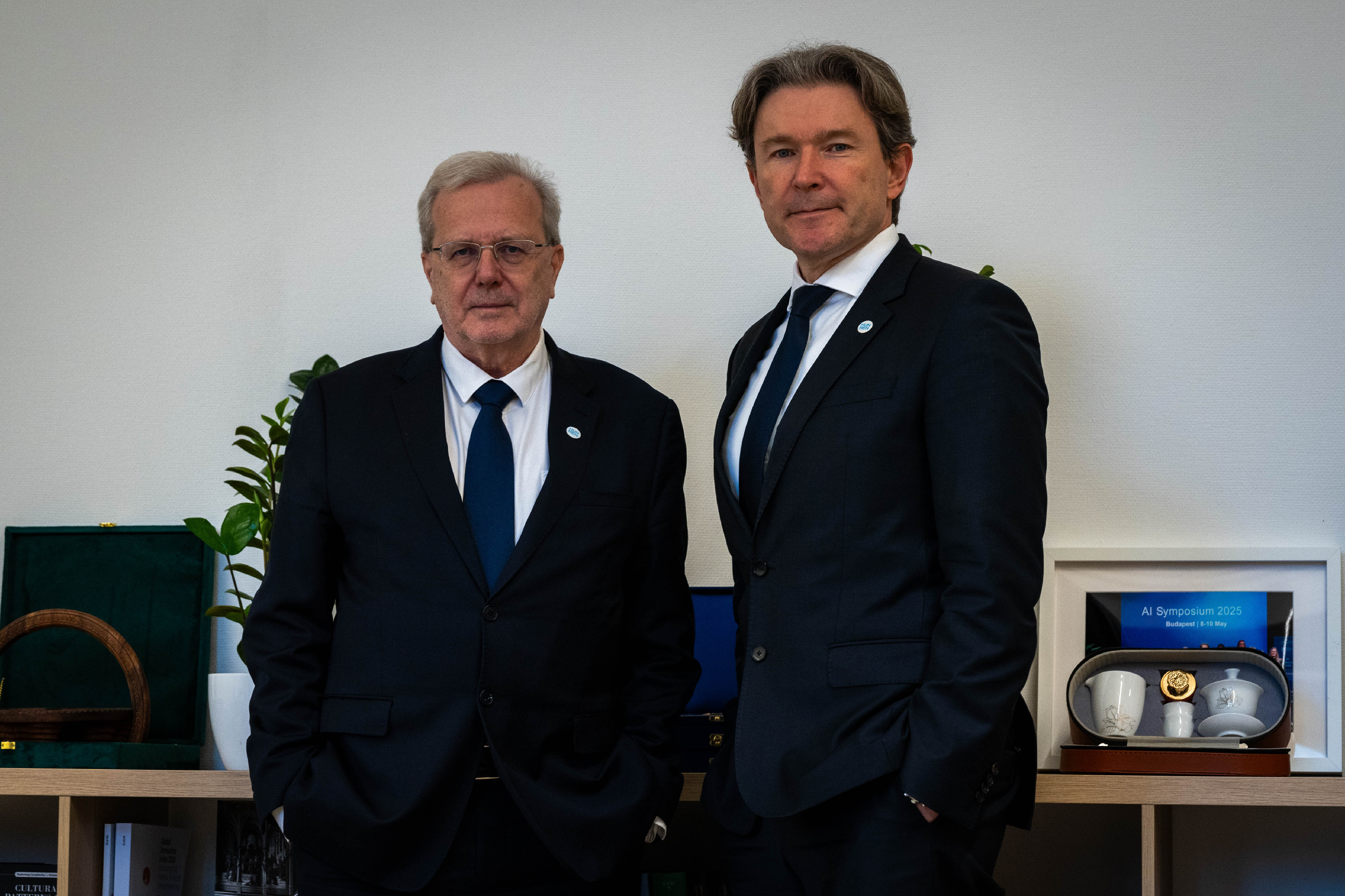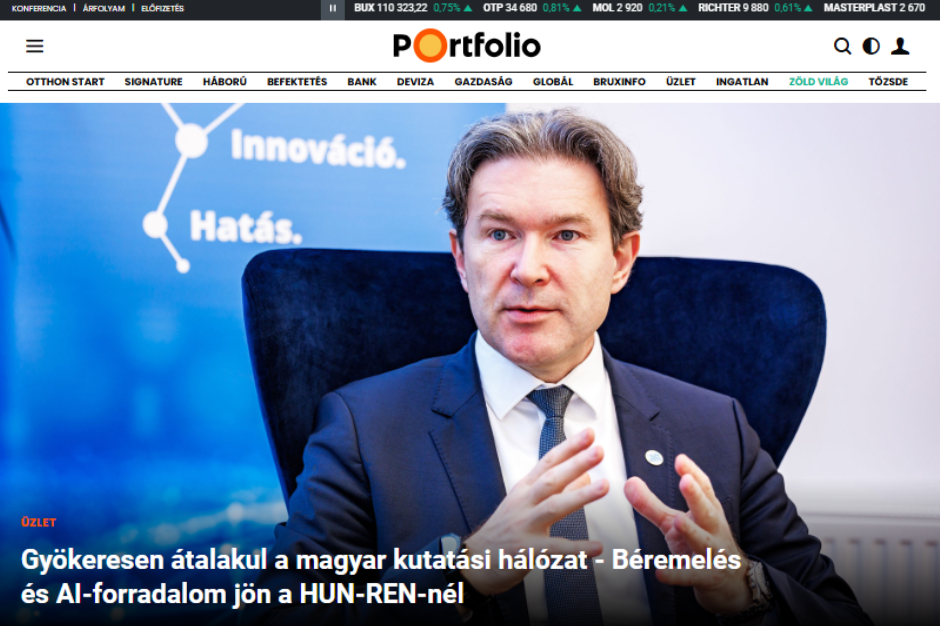"Like Fixing an Aeroplane Engine in Mid-flight"
HUN-REN’s transformation programme, launched as part of its renewal process, has been under way since January. The latest results and the challenges ahead were the focus of the afternoon panel discussions at the HUN-REN April Symposium.
The panel discussions on performance-based operations, the promotion of innovation and grant activity, and research careers were moderated by Katalin Sebők, Deputy CEO for Strategy and Innovation at HUN-REN. Participants included Attila Demény, Director of the Institute for Geological and Geochemical Research of the HUN-REN Research Centre for Astronomy and Earth Sciences; Péter Horváth, Director of Research at the HUN-REN Biological Research Centre in Szeged (HUN-REN BRC); later joined by Balázs Rózsa, researcher at the HUN-REN Institute of Experimental Medicine and the BrainVisionCenter; Gergely Szertics, Head of the HUN-AI Programme; Attila Erdős, physician and economist; Gábor Alexovics, Head of the Research Utilisation Division at HUN-REN; Zsófia Hartyányi, Advisor to the Deputy CEO for Strategy and Innovation; László Hunyady, Director of the Institute of Molecular Life Sciences at the HUN-REN Research Centre for Natural Sciences (HUN-REN RCNS); and Veronika Tamás, Head of the Secretariat of the Director General of HUN-REN RCNS.

Photo: DKP Visual Kft.
How can an organisation operate with minimum loss and maximum efficiency? These were among the key questions explored in the second section of the symposium. The discussion also addressed the legal framework of the transformation, the potential of AI-based operations, and human resources management. The session was moderated by Beáta Sótyné Hoffer, Deputy CEO for Operations at HUN-REN, who was joined by László Buday, Director General of HUN-REN RCNS; Judit Temesvári, Director of Finance at the HUN-REN Hungarian Research Centre for Linguistics; Ernő Rigó, certified engineer and IT specialist; and Csaba Tornyos, Head of the HR Department at HUN-REN.

Photo: DKP Visual Kft.
Transforming an organisation is never just an administrative task — especially when the aim is to build a new system that can both maintain continuous operation and take advantage of the benefits of a new structure. The final panel discussion of the symposium was moderated by János Horváth, Programme Director for Institutional Development at HUN-REN. The panel included Anikó Ludányiné Tamás, Director of Finance at HUN-REN BRC; Klára Vámos-Szigeti, Director of Finance at the HUN-REN Wigner Research Centre for Physics; Tünde Holes, Head of Department at HUN-REN; and Miklós Róka, Director of Finance at HUN-REN RCNS.

Photo: DKP Visual Kft.
Highlights from the panel discussions:
How can researchers be supported in the areas of grants and innovation within the research network?
In relation to grant activity, the panellists emphasised the importance of excellence-based evaluation, the sharing of successful applicants' and reviewers' experiences across the network, and the need for conscious career planning in research. One example was the recommendation that young researchers should avoid taking on the role of consortium leader, as this position differs significantly from traditional research activity and could even derail a scientific career. Regarding the development of support structures, the creation of a virtual mentoring network was proposed, in which researchers with different areas of experience could support one another.

Photo: DKP Visual Kft.
What can we learn from Cambridge Enterprise?
A model worth following in Hungary is the practice grounded in the freedom of knowledge — a principle adopted and implemented by Cambridge Enterprise. At the technology transfer centre of the prestigious British university, there is a strong belief that knowledge should bring societal benefit as early as possible. Researchers at the university are free to choose whether to collaborate with the technology transfer office, and if they do, they receive full support in bringing their results to application. Thanks to the available consulting and intermediary services, researchers can quickly access expert advice and connect with external partners — all without administrative burdens. The panellists agreed that this approach could be successfully adopted in Hungary.
What needs to be done to retain and support the development of the research community?
As researchers face different challenges and support needs at various stages of their careers — whether they are at the beginning of their career, balancing family life, or in senior roles — tailored tools and resources need to be provided. Early in a research career, support is primarily needed for obtaining a PhD, accessing training opportunities, and receiving mentoring. In later stages, meeting performance expectations — such as publishing research and securing grants — requires professional support services, mobility opportunities, and flexibility.
It is also important to take into account the personal circumstances of researchers — for example, career breaks due to parenthood. A modern evaluation system should reflect this and recognise achievements made during such periods, the panellists emphasised. One of the greatest challenges to remaining in research is achieving financial stability — especially for early-career researchers, who often work for extended periods with limited earning potential. This period of uncertainty is often accompanied by mobility requirements, which can lead to difficulties in personal life.

Photo: DKP Visual Kft.
How can a transforming organisation be brought up to speed digitally?
The active involvement of financial managers and the introduction of new operational regulations are essential to the success of the transformation. Organisational processes need to be designed in a way that reduces the burden of manual tasks through digital tools, increases transparency, and accelerates decision-making. In addition, open dialogue is needed to generate new impetus on the path towards operational excellence.
The discussion also highlighted that digitalisation, HR challenges, and IT infrastructure development are crucial to the success of the transformation, as motivating and retaining researchers in the 35–45 age group is a critical task in an ageing research community. There is also an urgent need to modernise HR systems, as many workflows are still paper-based or heavily reliant on Excel.
HR developments already implemented and those still ahead
A key element of the digital transformation is the introduction of a unified HR system that also enables performance evaluation. From an IT perspective, the long-term goal is to establish a scalable and reliable infrastructure.
At the same time, there are new HR service elements planned or already under way, for which HUN-REN will be able to take important steps as early as 2025. These include leadership training, employee development programmes, and various workplace wellbeing initiatives.
In the digital domain, well-functioning network-level services already exist, such as cloud services and data repositories. The aim is to make these accessible to as many users as possible — and to expand the offering with further similar services.
A fresh start is essential
The introduction of a new institutional system is not just a technical matter — it is essential that the new organisation is able to start with a clean slate, having settled the financial affairs of previous periods. This requires the ability to carry forward existing capabilities and professional values, while enabling responsible functional leads and their teams to explore the opportunities offered by the new operating model and integrate them into daily practice, the panellists noted.
HUN-REN’s transformation was guided by four institutional and operational principles:
- Operational continuity across the network must not be compromised — not even for a single day.
- The core activity of research must not be adversely affected by the transformation process.
- A transparent and straightforward regulatory framework had to be developed to support researchers in their daily work.
- Research and operations are closely interlinked: high-quality scientific work requires a well-organised institutional infrastructure.
Like fixing an aeroplane engine in mid-flight
The practical implementation of the new institutional system took place in three phases: preparing an interim closing report, providing comprehensive data to support decision-making, and designing the new operating model. The main challenge, however, was to carry all this out while keeping the system running — “like fixing an aeroplane engine in mid-flight,” as one panellist put it. The transformation therefore extended beyond the technical, encompassing both cultural and operational change.
A prerequisite for the organisation’s financial renewal
The success of HUN-REN’s financial renewal depends on carefully considered prioritisation. The first step was to sequence the tasks essential for basic operations — such as salary payments, purchasing, and bank account management. To ensure a smooth transition, it was necessary to establish a common framework and provide financial scaffolding to support the process.
The coordinating role of the central organisation, the sharing of best practices, and the collaboration between IT and finance leaders have given new impetus to the transformation process. The centralised yet flexible model offers an opportunity to preserve institutional specificities while establishing a unified structure for data provision, accounting, and operations.

